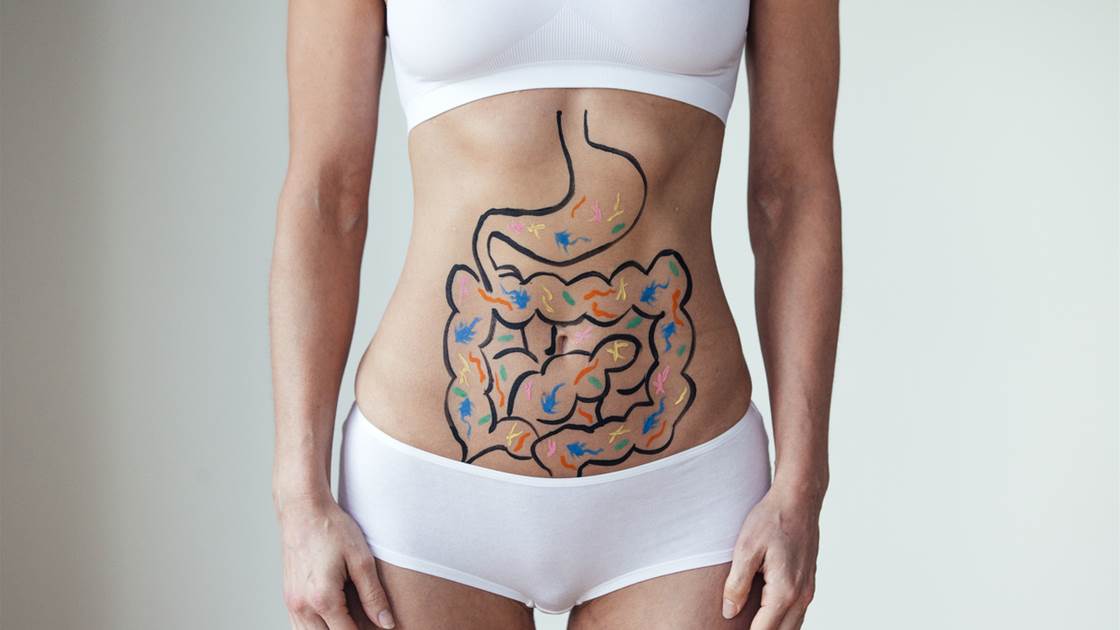If you’ve got a stomach (which, we’re guessing you do), chances are you’ve felt it misbehave from time to time—bloating, cramping, constipation or the opposite. But pinpointing why it’s upset isn’t always straightforward.
Here are some of the most common causes of stomach discomfort—and simple ways to manage them.
Common reasons for a stomach ache
Your mind
Ever felt your stomach drop before a presentation or go queasy during a stressful week? That’s no coincidence. The gut and brain are directly connected via the vagus nerve, which runs from the brainstem down through the abdomen.
“When something’s off mentally or emotionally, it can show up physically in your gut,” says professor of gastroenterology Dr Shanti Eswaran. That can lead to symptoms like constipation, diarrhoea or a more sensitive digestive system overall.
What can help: Stress-reducing habits like walking, mindfulness, or gentle yoga can ease gut sensitivity over time. If emotional triggers are significant, cognitive behavioural therapy (CBT) or, in some cases, antidepressants may be helpful.
Travel
Even short trips can mess with your digestive rhythm. Rushing to your gate, eating unfamiliar foods, skipping hydration and long periods of sitting can all contribute to sluggish digestion and constipation.
What can help: Stay hydrated, move around as much as possible (especially on long flights or car rides), and limit alcohol, which can dehydrate the gut. Some experts recommend magnesium citrate—between 200 mg and 400 mg daily—to help draw water into the colon and encourage bowel movement. Check with your GP before adding any supplement.
Antibiotics
Antibiotics are essential in fighting infections, but they can also disrupt your gut microbiome. “They wipe out the good bacteria along with the bad,” says Dr South, leaving your digestive system more vulnerable to imbalance—and sometimes triggering diarrhoea.
What can help: Focus on fibre-rich foods like legumes, oats, bananas and vegetables, which support healthy bacteria and help restore balance. While probiotic supplements are popular, Dr South notes the research on their effectiveness during antibiotic use is still mixed.
Your cycle
If you tend to experience diarrhoea around your period, you’re not imagining it. The same hormones that trigger your uterus to contract—called prostaglandins—can also stimulate the muscles in your intestines.
“Prostaglandins increase muscular activity, which can speed up your gut,” says professor of obstetrics and gynaecology Dr Mary Jane Minkin.
What can help: If it’s affecting your daily routine, speak to your GP about options like the oral contraceptive pill, which can regulate or suppress ovulation and potentially ease symptoms. Over-the-counter options like ibuprofen may also help by reducing the production of prostaglandins—just make sure to follow dosing directions and speak with your doctor if symptoms persist.
Coffee
Your morning brew may be doing more than waking up your brain. Coffee acts as a gastrointestinal stimulant in two ways. “It increases the overall movement of your GI tract and also heightens rectal sensitivity,” says Dr Eswaran. That combo can send some people racing to the loo soon after their first cup.
What can help: If coffee’s having a stronger effect than you’d like, try shifting the timing or limiting your intake to see how your gut responds. Also worth noting: very hot or very cold drinks can have a similar effect in sensitive individuals.
When to See a Doctor About Gut Issues
Not every tummy ache is cause for concern, but there are times when it’s worth speaking to a healthcare professional. Here’s what to keep an eye on:
Unexplained bloating or pelvic pain
If you feel full after eating very little or have persistent bloating with ongoing pain or diarrhoea, check in with your GP. While it’s often nothing serious, these could be symptoms of conditions like inflammatory bowel disease (IBD), or in rare cases, ovarian cancer.
Blood in your stool
It may be something as simple as a haemorrhoid, but any sign of blood should be mentioned to your doctor. It could also signal IBD or, less commonly, a growth or tumour.
Pale or greyish stool
Stool is usually a shade of brown, yellow or green. If it’s very light or grey, this may indicate a liver or bile duct issue. Don’t ignore it—book in for a check-up.
Unexplained weight loss
Losing weight without trying could point to coeliac disease or chronic gut conditions like Crohn’s disease or ulcerative colitis. Less commonly, it could signal pancreatic, gallbladder or bowel cancer. It’s always best to get it checked.
Pain in the lower left side of your abdomen
Severe pain with a fever could indicate diverticulitis, an infection in part of the large intestine. This typically requires antibiotics and may be followed by a high-fibre diet plan to prevent future flare-ups.
Why It’s Time to Talk More Openly About Your Gut
Many of us can talk openly about our children’s or pets’ bowel habits, yet feel awkward discussing our own. But paying attention to what comes out of your body can offer real clues about what’s happening inside.
Digestive health is central to overall wellbeing. Whether it’s bloating, constipation, loose stools or unexplained pain, your gut is often the first to signal when something’s off. Knowing what’s normal for you and when something seems different, can help you take early action—and that’s where real health prevention starts.










